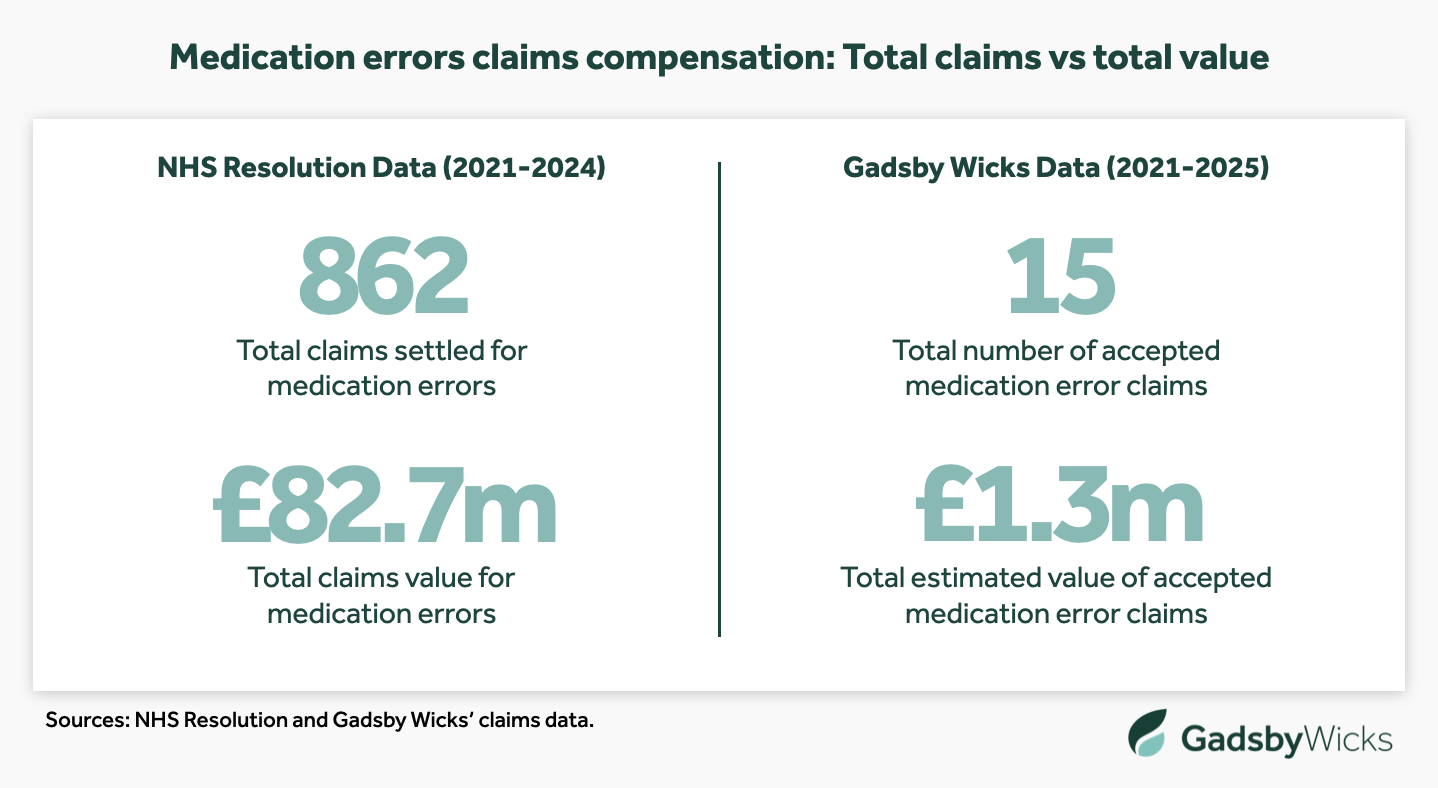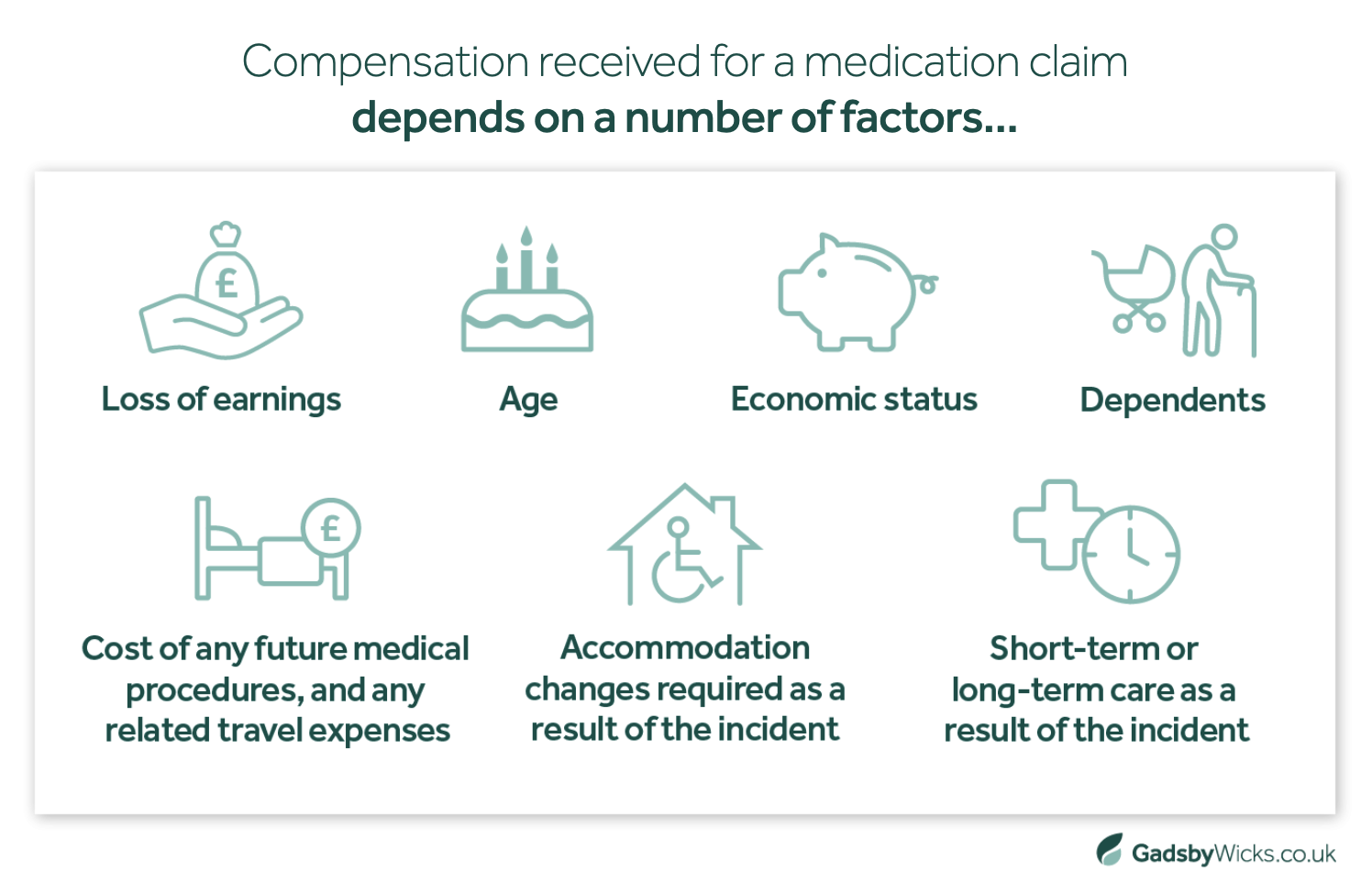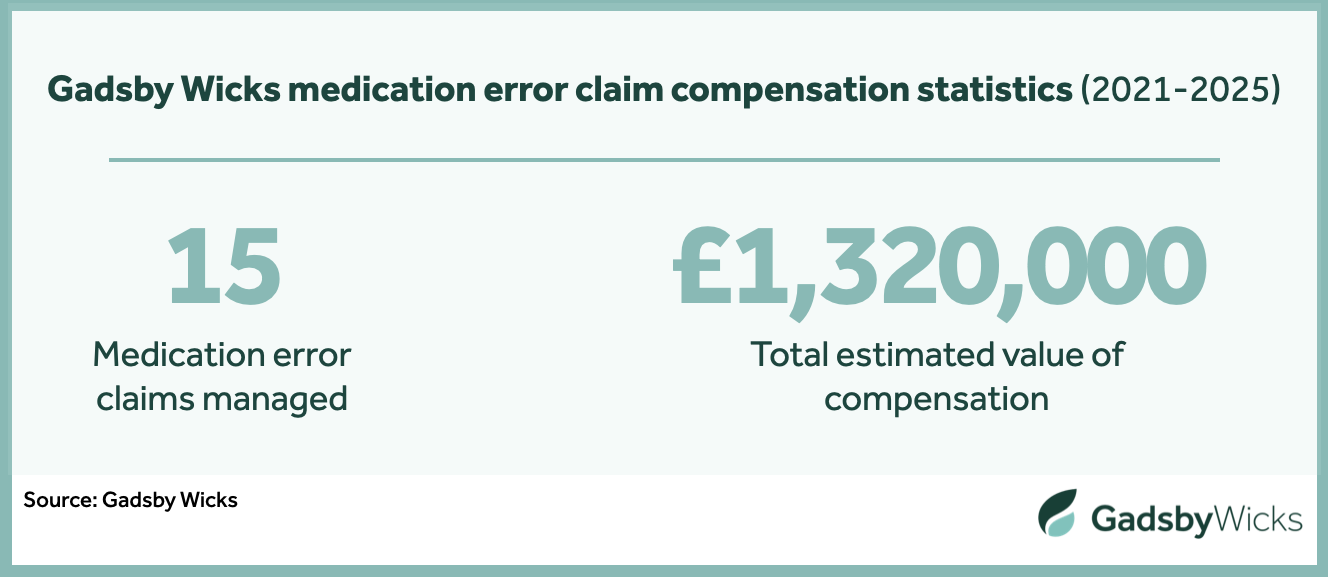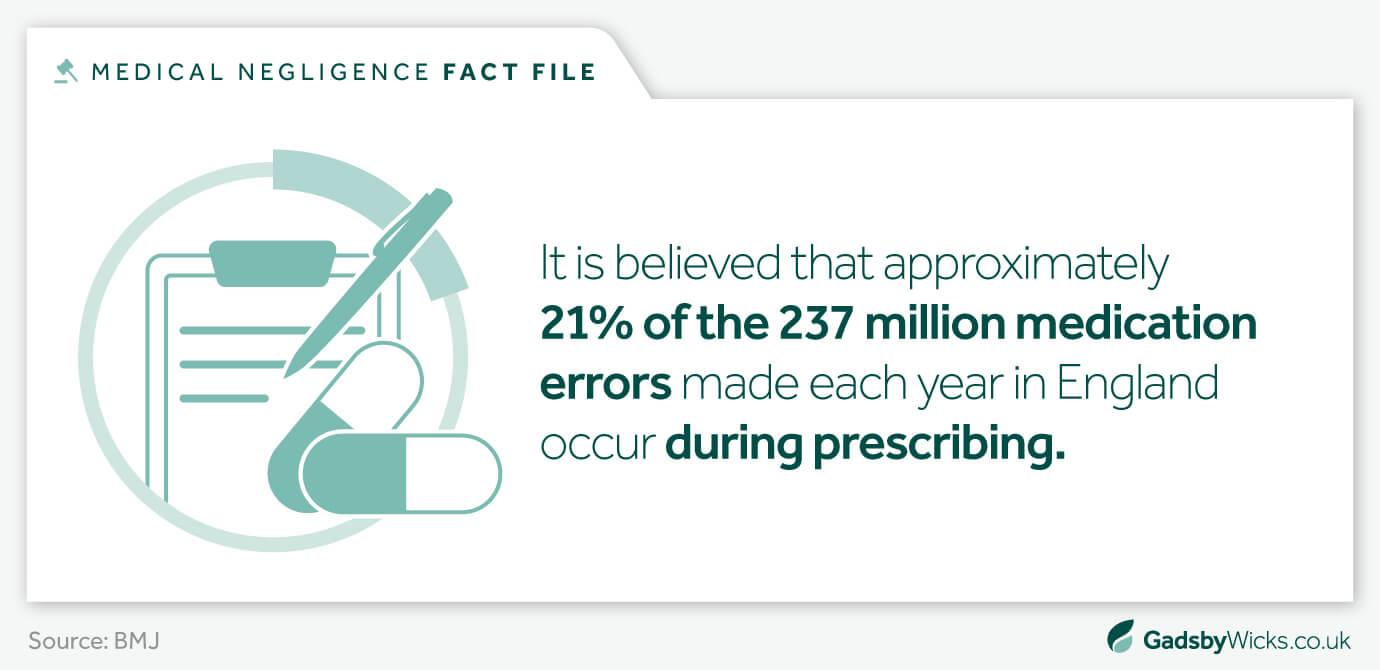- Home >
- Prescription and Medication Error Claims
When we are unwell, we expect healthcare professionals to prescribe or deliver the right medication. While the vast majority of medication is issued and dispensed correctly, we know mistakes happen that cause avoidable pain and suffering.
If your doctor issued the incorrect dose, or your pharmacy prescribed the wrong medication, you deserve compensation and answers. With over 30 years of experience and millions recovered for clients affected by prescription negligence, our solicitors pursue your case from start to finish to achieve the right settlement.

Do you have a medication error compensation claim?
Prescription and medication errors are thankfully rare. But if you suffered because your doctor prescribed the wrong drug, mislabeled medication or chose the incorrect administration route, you are entitled to claim compensation.
Whether a medication mistake caused an allergic reaction, prolonged your illness or another avoidable outcome, our highly experienced solicitors review all evidence to build the strongest possible case, securing a settlement that protects your financial future.

The specialist prescription error claims solicitors for Essex & East Anglia
Since 1993, we have helped countless claimants secure compensation and answers after preventable errors with their prescriptions or medication.
With decades of specialist experience, our medical negligence solicitors make claiming as seamless and stress-free as possible. Our ‘no win, no fee’ approach means you face no financial risk at any stage of your claim, and 96% of our cases settle outside of court for greater peace of mind.
Prescription and Medication Error Payouts & Compensation Guide
The compensation you may receive for a medication or prescription error claim depends on several factors, such as the type of mistake, how long it took to be identified and corrected, and the lasting effects on your health. Each case is different, and a payout reflects its specific circumstances.
For over 30 years, our experienced solicitors in Essex have secured settlements ranging from tens of thousands of pounds for minor harm to hundreds of thousands for life-changing injuries. We investigate exactly what went wrong and how it affected your life, securing the financial support you need for your recovery and peace of mind.

Understanding medication claims compensation in the UK
According to data supplied following a freedom of information request to NHS Resolution, there were fewer than 900 claims for medication errors settled between 2021/2022 and 2023/2024. The combined payouts of these claims were in excess of £82 million.
In these cases, the primary cause of these cases was one of the following:
- Errors with agent, dose or route selection
- Incorrect injection site
- Incorrect intravenous administration of concentrated potassium chloride
- Medication errors
- Wrong route administration of chemotherapy
Interestingly, the data also shows that total damages paid in 2023/2024 were 95% greater than damages paid in 2022/2023 (£37,633,670 vs £19,266,702).
Our own data of medication error claims in Essex and East Anglia shows that they are among the rarest types of negligence, representing just 2.7% of our total claims between 2021 and 2025.
We have also noticed fluctuations over the years in the overall value of compensation. The estimated value of claims we accepted in 2023 was 135% greater than in 2022, but this dropped 37% in 2024.
Using both nationwide NHS data and our own local data, we can conclude that the volume and value of medication claims fluctuate year-on-year. While most claims will settle for tens of thousands of pounds, some cases have recovered hundreds of thousands of pounds.
View our National and Essex Medical Negligence Statistics post for more information.
Here, it’s important to note that compensation awarded for a medication or prescription error is never intended as a windfall. It only ever accounts for the pain, suffering and lasting consequences caused by this negligent care.
With more than 30 years in medical negligence, our solicitors at Gadsby Wicks have supported countless individuals affected by prescription and medication mistakes. We understand how devastating it can be when your treatment is mishandled, and we fight for the justice and compensation you deserve.
How is prescription and medication claim compensation calculated?
Like all medical negligence claims, settlements for prescription or medication errors are divided into two segments: general damages and special damages.
General damages for prescription and medication claims
General damages relate to the physical and psychological harm caused by a medication or prescription error. This is often described as “pain, suffering and loss of amenity” – the impact on your health, wellbeing and overall quality of life.
When calculating general damages, we may refer to the Judicial College Guidelines. These guidelines offer rough compensation values for numerous types of injuries in personal injury claims, including (but not limited to):
- Brain and head injuries
- Injuries affecting the senses
- Injuries to internal organs
- Chronic pain
- Psychiatric and psychological damage
- Injuries resulting in death
We have included a sample of these values in the table below. Please be aware that this is not a complete list due to the wide range of possible injuries, and JCG figures are only estimates – medication compensation is calculated on a case-by-case basis.
Furthermore, the JCG is not as relied upon in medical negligence cases compared to personal injury claims. This is because people affected by medication or prescription errors are already likely to be unwell or injured, so we must determine if the patient was expected to return to their original state in any scenario, and compare this to the actual outcome.
For this reason, you should always choose solicitors with specialist expertise in medication and prescription error cases. We take a meticulous approach to every claim, ensuring that your settlement truly reflects the full physical and emotional impact on your wellbeing.
| Severity | Estimated Value Range | Notes |
|---|---|---|
| Brain injury | ||
| Very severe | £344,150 - £493,000 | Little meaningful response to environment, little language function, double incontinence and full-time nursing care. |
| Moderately severe | £267,340 - £344,150 | Seriously disability, with a substantial dependence on others and a need for constant professional care. |
| Moderate | £52,550 - £267,340 | Moderate to severe intellectual deficit and effects on sight, speech, senses, concentration and memory. |
| Less severe | £18,700 - £52,550 | Similar problems to moderate cases, but will have made a good recovery and will be able to take part in normal social life. |
| Bowel injury | ||
| Severe | Up to £224,790 | Cases involving double incontinence – total loss of bowel function and urinary function and control. |
| Moderately severe | Up to £183,190 | Total loss of natural function and dependence on colostomy (depending on age). |
| Moderate | In the region of £97,530 | Persistent faecal urgency and passive incontinence causing embarrassment or distress. |
| Less severe | £54,420 - £85,100 | Severe abdominal injury often necessitating temporary colostomy and/or restriction on diet and employment. |
| Bladder injury | ||
| Severe | Up to £224,790 | Cases involving double incontinence – total loss of bowel function and urinary function and control. |
| Moderately severe | Up to £171,680 | Complete loss of function and control. |
| Moderate | £78,080 - £97,540 | Serious impairment of control with some pain and incontinence. |
| Less severe | £28,570 - £38,210 | Where there has been almost a complete recovery but some fairly long-term interference with natural function. |
| Digestive system injury | ||
| Severe | £46,900 - £64,070 | Severe toxicosis causing serious acute pain, vomiting, diarrhoea and fever, requiring hospital admission. |
| Serious | £11,640 - £23,430 | Serious but short-lived food poisoning, diarrhoea and vomiting diminishing over two to four weeks. |
| Moderate | £4,820 - £11,640 | Food poisoning or allergic reaction causing discomfort, stomach cramps, alteration of bowel function and fatigue. |
| Female reproductive system injury | ||
| Very severe | £140,210 - £207,260 | Infertility with sexual dysfunction, severe depression and anxiety, pain and scarring. |
| Severe | £52,490 - £124,620 | Likely permanent sexual dysfunction in the case of a person with children or who is unable to have children. |
| Moderately severe | £68,440 - £87,070 | Infertility with no aggravating features and no sexual dysfunction in a young person without children. |
| Moderate | £21,920 - £44,840 | Infertility without medical complications and no sexual dysfunction where the injured person already has children. |
| Kidney injury | ||
| Severe | £206,730 - £256,780 | Serious and permanent damage to or loss of both kidneys. |
| Serious | Up to £78,080 | Where there is significant risk of future urinary tract infection or other total loss of natural kidney function. |
| Moderate | £37,550 - £54,760 | Loss of one kidney with no damage to the other |
| Injuries affecting sight | ||
| Most severe | In the region of £493,000 | Total blindness and deafness. |
| Very severe | In the region of £327,940 | Total blindness. |
| Severe | £78,040 - £219,400 | Loss of sight in one eye with reduced vision in the remaining eye, depending on extent of vision loss. |
| Moderately severe | £66,920 - £80,210 | Total loss of one eye, depending on age, psychiatric consequences and cosmetic effect. |
| Moderate | £60,130 - £66,920 | Complete loss of sight in one eye, taking account of some risk of sympathetic ophthalmia. |
| Deafness or tinnitus | ||
| Very severe | £133,810 - £171,680 | Total deafness and loss of speech, often due to deafness occurring at an early age. |
| Severe | £110,750 - £133,810 | Total deafness, with award depending on occurrence of speech deficit or tinnitus. |
| Moderately severe | £38,210 - £55,570 | Total loss of hearing in one ear, with award depending on level of tinnitus, dizziness or headaches. |
| Moderate | £8,560 - £55,570 | Partial hearing loss and/or tinnitus. |
| Impairment of taste/smell | ||
| Severe | In the region of £47,810 | Total loss of taste and smell. |
| Moderately severe | £40,150 - £47,810 | Total loss of smell and significant loss of taste. |
| Moderate | £30,500 - £40,150 | Loss of smell only. |
| Serious | £23, 430 - £30,500 | Loss of taste only. |
| Chronic pain disorders | ||
| Severe | £51,410 - £76,870 | Significant, ongoing symptoms despite treatment, adversely impacting ability to work and requiring care/assistance. |
| Moderate | £25,710 - £46,970 | Symptoms are ongoing, albeit to a lesser degree than the above and a less marked difference on daily life. |
Special damages for prescription and medication claims
Special damages relate to financial losses caused by a medication or prescription error – covering both costs you’ve already faced and any future expenses resulting from the mistake.
Examples of special damages can include:
- Medical and rehabilitation costs, including corrective treatment, consultations, and any medication or therapy required to manage the effects
- Equipment, accommodation and transport, such as mobility aids, home adaptations or modified vehicles made necessary by your condition
- Care and support expenses, covering professional care services or additional assistance in your daily life
- Loss of earnings, compensating for income lost during recovery and any impact the error has on your ability to work
- Travel expenses, including journeys to hospitals, pharmacies, clinics and appointments related to your treatment and recovery

Special damages are assessed with each individual’s unique circumstances and ongoing care requirements – meaning the amount of compensation can vary widely.
For example: a young, employed adult is given the wrong dosage of medication and develops kidney damage. Their payout may be greater than someone who is retired or wealthier, even if the injury is the same. This is because it may have a bigger impact on their earning potential and economic status.
By working closely with medical professionals, care experts and forensic accountants, our experienced solicitors evaluate the full financial and practical effects of your specific case – ensuring that your special damages reflect your needs, recovery and long-term wellbeing.
What is the average medication or prescription claim settlement in Essex?
People often ask what the average worth of a medication or prescription claim is. However, an average settlement is misleading because every claim is unique. Every case is shaped by different factors – from the type of medication involved to its long-term effects – meaning outcomes vary greatly.

At Gadsby Wicks, we take the time to understand your experience, how the error has affected your health, and what you need to move forward. With decades of medical negligence expertise, we are dedicated to achieving a settlement that supports your future.
Should I use a prescription or medication compensation calculator?
You may find online tools claiming to calculate how much your medication or prescription error claim could be worth – but these are often inaccurate.
Compensation calculators are usually designed to attract enquiries rather than provide genuine advice. With decades of experience across Essex and East Anglia, we know that no claim can be accurately valued without understanding your personal circumstances and reviewing the medical evidence.
At Gadsby Wicks, we prioritise openness and honesty. Every client’s experience is different, so we take the time to learn exactly how the medication error has affected your life before offering clear, realistic advice about the compensation you can expect.
Securing the medication claim compensation you deserve
We hope this has given you a better understanding of compensation for medication and prescription errors – and why there’s no fixed or “average” settlement.
With over 30 years of experience supporting people affected by medical mistakes, we don’t rely on generalisations or quick figures. Instead, we take the time to understand exactly what happened, how the error has impacted your health and lifestyle, and what compensation you need to move forward.
Combining our specialist expertise with a proven record, we’re here to guide you through every stage of your claim, ensuring that the final settlement truly reflects your experience and supports your long-term wellbeing.
Want to know more about prescription and medication claim compensation? Listen to Gillian Gadsby and Tami Frankel’s informative podcast.
What does our medication error claim process look like?

A free initial consultation
Call us, request a callback or complete our online form and we’ll assess if you have a valid medical negligence claim.

Funding your claim
Discover the ways we can fund your claim without you paying a penny at any stage of the process.

Investigating evidence
We gather medical records, witness statements and more to learn what happened to you and prove your claim.

Instructing independent medical experts
We work with impartial, experienced medical experts to establish whether your injuries were due to substandard medical care.

Valuing your claim
We assess your health and financial losses to accurately estimate how much compensation your claim is worth.

Presenting your case
We contact the Defendants and the Courts on your behalf to set out your allegations and receive a response.

Negotiating a settlement
We work to achieve a fair settlement for you outside the courtroom – this is how 96% of our cases end.

Preparing for Trial
If we must proceed to Trial, we fully prepare you for what to expect so you receive the right result in court.
FAQs about prescription error negligence claims
What is a prescription or medication error claim?
A prescription error claim is when you pursue compensation for injuries, suffering and other losses caused by a mistake(s) involving your prescription or medication.
Over a billion prescription items are distributed each year across England. The majority is correctly prescribed by doctors and dispensed by pharmacists. However, mistakes do happen.
They typically fall into two main categories:
- Prescription errors, which happen when a GP or doctor issues the wrong dose, type or form of medication to an individual
- Dispensing errors, which arise when a pharmacist is to blame for a person receiving incorrect, ineffective or actively harmful medication
When prescription errors happen, those affected have the right to seek compensation. This can help them pay for replacement medication, fund further treatments and recoup any financial losses caused by this error, among other expenses.
If you were given the wrong prescription by a medical professional, or a pharmacist made a mistake when dispensing medication, our experienced solicitors meticulously investigate every piece of evidence and consult impartial medical professionals to get to the bottom of what happened to you.
How common are medication and prescription errors?
Research published by The British Medical Journal (BMJ) in 2020 highlighted that over 237 million medication errors are made every year in England, costing the NHS over £98 million per year.
However, between 2015 and 2020, NHS Resolution claims it settled 487 claims related to medication errors, with £10,419,356 total damages paid in closed claims.
There is little more recent evidence available, but this snapshot of data suggests that while prescription and medication errors are fairly common, the overwhelming majority are either corrected before they harm the patient, or have no significant impact on the person’s health and wellbeing.

What are common types of prescription and medication errors?
Common prescribing errors include:
- Prescribing the incorrect dosage or frequency of medication
- Incorrectly labelling medication
- Storing drugs at the incorrect temperature
- Issuing the wrong format of drugs (e.g. prescribing a pill when a patient should take liquids)
- Prescribing drugs that conflict with an individual’s allergies or other prescriptions
- Failing to give clear guidance on how to administer the medicine prescribed
- Excluding sufficient details on a prescription
In addition, common forms of medication errors include:
- Incorrect medical agent, dose or route selection
- Wrong injection site
- Intravenous administration mis-selection
- Wrong route administration of chemotherapy
If you or someone you love suffered physically, emotionally or financially as a result of these errors, our experienced solicitors are here to help you make a wrong prescription claim.

What are the consequences of a medication error?
Research suggests that 72% of medication errors have minor or no harmful consequences, with 26% causing moderate harm and just 2% serious harm.
In cases of moderate or serious harm, consequences may include:
- More severe or frequent side effects
- Allergic reactions
- Intense adverse reactions
- Progression of underlying illness or condition
These ramifications are more likely to be grounds for a compensation claim – speak to our specialist lawyers for advice about your situation.
How do you prove negligence in a medication error claim?
There are three key questions that must be answered to prove you have a valid medical negligence claim:
- Did your healthcare provider breach their duty of care towards you?
- Did you suffer pain, injury, financial loss or damage?
- Was your suffering the direct result of your healthcare provider’s breach of duty?
Our specialist medical negligence solicitors gather and assess all available evidence connected to your claim – including medical records, personal statements, photographs and more – to prove the validity of your claim.
We will also consult impartial medical experts to determine whether the actions of those responsible fell short of expectations, and quantify the impact of this negligence.
If you would like to learn more about how we can prove and support your claim for medication errors, visit our dedicated claims process page.
How much compensation can I claim for a prescription error?
Compensation for prescription and medication errors varies greatly depending on their impact. Most claims secure payouts in the tens of thousands of pounds – in the most serious cases, cases can settle for over £1 million.
Ultimately, the final settlement will depend on the specifics of your case – such as the extent of the negligence caused and its long-term ramifications.
Compensation helps you get back to where you were before the negligence occurred, or supports necessary changes to your life. If your claim is successful, the resulting compensation can cover a wide range of costs, including:
- Further medicine or treatments
- Loss of earnings while recovering from the effects of a prescription error
- Future financial losses
- Any necessary equipment or aids
- Therapies or support for any psychological harm caused
- Paying for services you or your loved can no longer perform (e.g. gardening or household chores)
- Any adaptations required to your home or vehicles
Contact our expert prescription and medication error claims solicitors
If you or someone you care about has been affected by a medication error, speak to our team about your options. We are here to listen and advise you on your next steps.

Lexcel accredited medical negligence claims solicitors
We are proud to be a Lexcel-accredited practice. The accreditation is a mark of quality and comes directly from the Law Society.
A recent assessment described us as a “Centre of Excellence” and we continue to operate to the highest standards across all main areas of our field. These include client care, case management, financial management, structure and strategy, people management, risk management, information management and file management.







